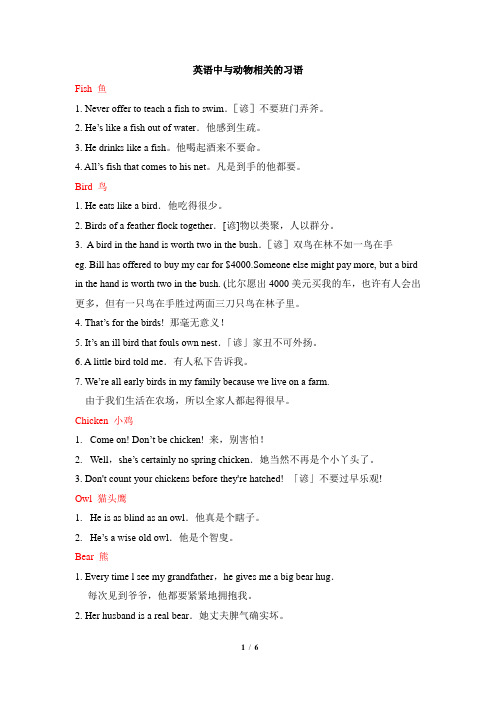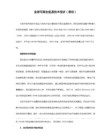英语习语中的动物 金融篇
论文:英语中的动物习语

英语中的动物习语汉语中有许许多多幽默精炼、言简意赅的俗语谚语,它们的存在使我们平时对话更加生动有趣,使中华文明更加意蕴深长。
英语,世界上应用最广泛的语言,以它自身独有的魅力征服了七大洲。
不仅是众多西方国家的官方语言,在非英语国家,它作为重要的第二语言被越来越多的人们学习研究着。
这其中,有许多活泼的习语增加了英语的表达效果,体现了西方文化特点。
在诸多英文名篇中,因为有了习语的点缀,作品更加令人回味。
动物是人们日常生活中不可缺少的一个组成部分,论是乡间役使的牛马还是都市豢养的宠物,都与人们须臾不离。
语言作为社会文化的一个组成部分,自然不可能免受影响。
英语中的动物习语鲜明地突出了动物的特点,精炼而深刻。
以下,就是我收集的动物习语:Fish 鱼1.Never offer to teach a fish to swim.[谚]不要班门弄斧。
2.He’s like a fish out of water.他感到生疏。
3.He drinks like a fish。
他喝起酒来不要命。
4.All’s fish that comes to his net。
凡是到手的他都要。
Bird 鸟1. He eats like a bird.他吃得很少。
2. Birds of a feather flock together.[谚]物以类聚,人以群分。
3. A bird in the hand is worth two in the bush.[谚]双鸟在林不如一鸟在手eg. Bill has offered to buy my car for $4000.Someone else might pay more, but a bird in the hand is worth two in the bush. (比尔愿出4000美元买我的车,也许有人会出更多,但有一只鸟在手胜过两面三刀只鸟在林子里。
4. That’s for the birds! 那毫无意义!5. It’s an ill bird that fouls own nest.「谚」家丑不可外扬。
英语中的动物习语

英语中的动物习语英语中的动物习语1.名词1) ant 蚂蚁have ants in one’s pants (因焦急、气愤等)坐立不安,急于行动2)bear 熊、粗鲁的人、笨拙的人;股市中的空头一方;be a bear for punishment 能忍受粗暴待遇的、顽强的、倔强的;Sell the bear’s fur before one has caught the bear. 做事过早乐观了。
3)bug 臭虫,狂热、癖好、……迷;(贬)要人、名人have a bu g about… 热衷于……; a camera bug 摄影迷; a big bug (贬)大亨put a bug in sb.’s ear 事先给某人暗示、警告4)bird 鸟,(俚)人、家伙、姑娘;(讽)非凡人物an old bird 老家伙、精明鬼;What a queer bird! 真是个怪人!a bird in the bush 未到手的东西、未定局的事(与a bird in the hand相对);a bird of ill omen 猫头鹰、报凶讯的人;a bird of Jove 鹰; a bird of Juno 孔雀;a bird of paradise 极乐鸟; a bird of passage 候鸟、飘泊不定的人;a bird of wonder=a secular bird 凤凰;a jail bird 囚犯;an early bird 早起的人;birds of a feather 一丘之貉;Birds of a feather flock together. 物以类聚,人以群分。
A little bird told me/whispered to me. 有人私下告诉我。
for the birds 荒唐可笑、毫无意义;get the bird 被喝倒彩、被解雇;It is an ill bird that fouls its own nest. 家丑不可外扬。
英语中与动物相关的习语

英语中与动物相关的习语Fish 鱼1. Never offer to teach a fish to swim.[谚]不要班门弄斧。
2. He’s like a fish out of water.他感到生疏。
3. He drinks like a fish。
他喝起酒来不要命。
4. All’s fish that comes to his net。
凡是到手的他都要。
Bird 鸟1. He eats like a bird.他吃得很少。
2. Birds of a feather flock together.[谚]物以类聚,人以群分。
3. A bird in the hand is worth two in the bush.[谚]双鸟在林不如一鸟在手eg. Bill has offered to buy my car for $4000.Someone else might pay more, but a bird in the hand is worth two in the bush. (比尔愿出4000美元买我的车,也许有人会出更多,但有一只鸟在手胜过两面三刀只鸟在林子里。
4. That’s for the birds! 那毫无意义!5. It’s an ill bird that fouls own nest.「谚」家丑不可外扬。
6. A little bird told me.有人私下告诉我。
7. We’re all early birds in my family because we live on a farm.由于我们生活在农场,所以全家人都起得很早。
Chicken 小鸡1. Come on! Don’t be chicken! 来,别害怕!2. Well,she’s certainly no spring chicken.她当然不再是个小丫头了。
3. Don't count your chickens before they're hatched! 「谚」不要过早乐观!Owl 猫头鹰1. He is as blind as an owl.他真是个瞎子。
英语中与动物有关的习语

英语中与动物有关的习语英语中与动物有关的习语1.go to the dogs 堕落The poor man went to the dogs after he lost his job.那可怜的人失业之后就堕落了。
2.make a pig of oneself 猛吃猛喝He always makes a pig of himself.他总是暴饮暴食。
3.smell a rat 感到不妙(rat老鼠)When he saw the policemen walking to him,he smelt arat.当他看到警察朝他走来时,就感到不妙。
4.hold one’s horses 耐心Hold your horses,we still have some time left.耐心点,我们仍然有时间。
5.get one’s goat 令某人生气/发火The students got his goat because they didn’t d o theirhomework.学生们因为没有做家庭作业使他很生气。
6.do the donkeywork 做呆板的例行工作(donkey驴)He had to do the donkeywork.他不得不做那些呆板的工作。
7.put one’s monkey up 使某人生气Your last word put his monkey up.你最后一句话使他很生气。
8.kill two birds with one stone 一举两得He killed two birds with one stone by shopping and seeing thefilm.他既买了东西又看了电影,真是一举两得。
9.rise up with the lark 早起(lark云雀)Every day my mother rises up with the lark.我母亲每天都早起。
动物习语

He told us some cock-and-bull stories about having lost all his money.他鬼话连篇,告诉我们他把钱都弄丢了。
2、 like a red rag to a bull 可能激起强烈的憎恨,暴力行为。
Her remarks were like a red rag to a bull. He was furious with her. 她的话惹得他对她暴跳如雷。
1、 keep the wolf from the door 有维持温饱的钱。
Their wages are barely keeping the wolf from the door. 他们的工资勉强够维持生活。
八、 与“BULL”有关的习语和词组
1、 a cock-and -bull story 无稽之谈(尤指用作借口和解释的)
四、与“BIRD” 有关的习语和词组
1、 a little bird told me that... 我听说 (但我不告诉你我是怎么知道的)。
A little bird told me that you had been caught cheating in the English exam. 我听说你英语考试时作弊被逮到了。
3、 the rat race 激烈的竞争。
Jim is the winner in the rat race; he is promoted to be the general manager. 吉姆在激烈的竞争中胜出;他被提拔为总经理。
七、与“WOLF”有关的习语和词组
2、 not say boo to a goose 形容非常胆小。
英语中与动物有关的习语

二.奇妙的“动物世界”。
a white cow 罕见的东西the dog days 大热天make a duck 零分a cat in the pan 叛徒a white elephant 沉重的负担a lazy dog 懒汉a dog `s age 很长的时间rain cats ahd dogs 下倾盆大雨a lion in the way 拦路虎a dog`s life 悲惨的生活1 chicken head -- 笨蛋2 to cock his nose --- 瞧不起人的样子3 a poor fish --- 倒霉而易上当的人4 a cock of the school --- 横行霸道的学生5 a cold fish --- 古怪的人动物是人类的好朋友,英语中有很多有趣的俚语和习语都与动物有关。
同学们,你们知道吗?我们一起来看一下吧!Doga dog in the manger 狗占马槽put on the dog 炫耀,摆阔go to the dogs 一蹶不振dog-eared books读得卷了边的书dog sleep 不时惊醒的睡眠dog watch夜班a sly dog偷鸡摸狗者a yellow dog 杂种狗,卑鄙可耻的小人a big dog看门狗,保镖;要人You are a lucky dog! 你真是个幸运儿!dog nose 啤酒与杜松子酒的混合酒a dog in a blanket葡萄卷饼或卷布丁Cat like a cat on hot bricks 非常紧张,象热锅上的蚂蚁set the cat among the pigeons引来可能招惹是非或麻烦的人或事物more than one way to skin a cat 剥猫皮各有巧妙不同(另有办法)rain cats and dogs 倾盆大雨a cat nap 打个盹儿let the cat out of the bag 放出袋中猫(泄漏秘密)Kitty corner 小猫的角落(斜对角)Fishplenty of other fish in the sea海里鱼儿多的很(天涯何处无芳草)fish in troubled waters 浑水摸鱼bigger fish to fry 有更大的鱼要炸(有更重要的事情要办)like shooting fish in a barrel 桶里射鱼(瓮中捉鳖)Birdthe early bird catches the worm早起的鸟才能捉到虫(捷足先登)an early bird 早到或者早起的人a bird in the hand is worth two in the bush一鸟在手胜过两鸟在林birds of a feather flock together羽毛相同的鸟总飞成一群(物以类聚)Horse white horse 白浪put the cart before the horse 车在马前(本末倒置)straight from the horse’s mouth 听马说的(根据最可靠的消息来源)a willing horse 积极工作的人hold one’s horses 等一下,忍耐,控制自己的感情eat like a horse吃得很多beat a dead horse 鞭打死马(徒劳)don’t look a gift horse in the mouth赠马不看牙(收人礼物别嫌好道歹)Bear like a bear with a sore head 易怒的,脾气坏的a bear garden 嘈杂,喧闹的场所或者会议Sheepmake a sheep’s eyes at somebody 傻乎乎地向某人送秋波separate the sheep from the goats 把好人同坏人分开其他:a fly in the ointment 扫兴的人或者事物at a snail’s pace 极慢的a snake in the grass 伪装成朋友的阴险小人rabbit punch (用掌边对某人颈背的)重击a white elephant 无用而累赘之物monkey business 猢狲把戏(胡闹)monkey on one’s back 背上的猴子(难以摆脱的负担)straw that broke the camel’s back压倒骆驼脊梁的稻草(最后致命的一击)when pigs fly 猪飞的时候(绝不可能)a social butterfly 社交蝴蝶(善于交际,会应酬的人)ants in one’s pants 坐立不安bull in a china shop 瓷器店里的蛮牛(笨拙的人)butterflies in one’s stomach 肚里有只蝴蝶(七上八下)like pulling hen’s teeth 跟拔母鸡的牙一样(艰苦不堪)关于马的谚语:You can take a horse to the water, but you can';t make him drink. 策马溪边易,逼马饮水难.A horse may stumble on four feet. 人有失足,马有漏蹄.A running horse needs no spur. 奔马无须鞭策.Don';t put the cart before the horse. 不要把车套在马前.(不要本末倒置.)The common horse is worst shod. 公用之马掌最差.Lock the barn door after the horse is stolen. 失马之后锁马厩.(亡羊补牢.)Hair by hair you will pull out the horse';s tail. 一根一根拔,拔光马尾巴.(水滴石穿.) 关于狐狸的谚语:The fox may grow grey, but never good. 狐狸毛色可以变灰,但是本性难改.(江山易改,本性难移.)The fox preys farthest from his hole. 狐狸捕食,远离洞府.(兔子不吃窝边草.)When the fox preaches, then take care of your geese. 每当狐狸说教,当心鹅群被盗.When the fox says he is a vegetarian, it';s time for the hen to look out. 狐狸说它吃素时,母鸡要注意.有关狼的谚语:Don';t trust a goat with the kitchen-garden, or a wolf withsheepfold. 不能请羊管菜园,不能请狼管羊圈.有关羊的谚语:If one sheep leaps over the ditch, all the rest will follow. 一只羊跨过沟,其它羊也会跟着做.(榜样的力量是无穷的.)有关老鼠的谚语:It is a poor mouse that has only one hole. 狡兔三窟.A speck of mouse dung will spoil a whole pot of porridge. 一粒老鼠屎,坏了一锅粥.有关鸡的谚语:Don';t count your chickens before they';re hatched. 鸡蛋未孵出,先别数小鸡.(不要过早乐观.) 有关兔的谚语:You cannot run with the hare and hunt with the hounds. 不能既和野兔一起跑又和猎狗一起追.(人不应两面讨好.)4. A bird in the hand is worth than two in the bush.一鸟在手胜过双鸟在林。
与动物有关的8条习语

与动物有关的8 条习语
英语中,许多习语与动物相关,下面几条最为常用!小伙伴们快点
记下,和朋友们聊天秀起来!
1. Monkey business
1.猢狲把戏
silly or deceitful behavior; stupid or time-wasting activity
愚蠢行为或欺骗行为;毫无意义或浪费时间的举动
Our accountant has been fired as there was some monkey business with the books.
会计师对账单做了手脚,已经遭到解雇。
Are you still fiddling about with those old tools? Stop the monkey business and get some new ones.
还在摆弄这些旧工具吗?别浪费时间了,换套新的吧。
2. Rat race
2.激烈的竞争
an exhausting routine, a hectic struggle for success
累人的工作,为了成功拼命奋斗
Im so tired of the rat race. Id love to retire and move to the country.
这里竞争过于激烈,让人感到精疲力竭。
我打算退休,移居乡下
了。
She started to work from home as she couldnt stand the rat race at the office.
由于不能忍受办公室激烈的竞争环境,她开始在家办公了。
3. Cat burglar
3.飞贼。
金融英语口语对话:publicmoney

以下是⽆忧考整理的《⾦融英语⼝语对话:public money》,希望⼤家喜欢! New Words新单词 buck n. 元 greenback n. 美钞 dough n. (美俚)钱 assistant n. 售货员 change n. 找头,零钱 sovereign adj. 独⽴⾃主的uncountable adj. 不可数的 mare n. 母马,牝驴 Phrases & Expressions 短语 public money 公款 tax money 税款 A:Now let's talk about paper money. A:现在我们来谈谈纸币吧。
B:Yes, paper money can be folded into a wallet. Every country produces its own. B:好,纸币可以折叠放进钱包。
每个国家都印制纸币。
A:Another term for paper money is 'note' or'banknote', we say a five-yuan note, A:纸币的另⼀种叫法是钞票,我们⼀般讲⼀张五元的钞票, a twenty-cent note. In American English, 'bill' is another term. ⼀张两⾓的钞票。
美国英语把钞票叫Bill。
美国俚语中叫钞票的词更多, In American slang you may hear 'a hundred dollar bill' or 'a buck' as 'ten bucks' or 'greenback' or 'long green(folding green)' or 'folding money'. 我们到听到⼀百元美钞,⼀元,⼗元,以及greenback ,long green(folding green ),folding money等钞票的各种说法。
- 1、下载文档前请自行甄别文档内容的完整性,平台不提供额外的编辑、内容补充、找答案等附加服务。
- 2、"仅部分预览"的文档,不可在线预览部分如存在完整性等问题,可反馈申请退款(可完整预览的文档不适用该条件!)。
- 3、如文档侵犯您的权益,请联系客服反馈,我们会尽快为您处理(人工客服工作时间:9:00-18:30)。
The finance world famously has almost a language all of its own, ranging from complex financial jargon to the playful slang of the stock market. What that means is that within the thicket of terms like VaR, backwardation,contango, tranche, and junkbond, we find some familiar animal friends — although often in some strange contexts.金融世界有一套广为流传的自己的语言,包括复杂的金融术语,以及戏谑的股票市场俏话。
而在错综复杂的诸如加值型经销商、现货溢价、期货溢价、一期款项、垃圾债券这类术语中,还有一些我们熟悉的动物伙伴——尽管它们也常出现在奇怪的语境中。
The bulls and the bears牛和熊When it comes to the wildlife of Wall Street, two animals should immediately cometo mind: bulls and bears. With the bear standing in for a downward-trending market and the bull in for an upward-trending one, these two have stood in opposition to one another since the 18th century.说道华尔街的野生动物,人们立刻就会想起牛和熊。
自18世纪以来,熊就代表着股市下跌,而牛代表着股市上扬。
The Oxford English Dictionary (OED) frames this financial use of bear as preceding that of bull, suggesting that this use of ―bear‖ probably extends from the idiom ―to sell the bear’s skin before one has caught the bear.‖ These bearskin traders then hope for a downturn in the market so that they might make a larger profit on the transaction.牛津英语词典认为“熊市”的用法先于“牛市”。
它的用法是由谚语“熊未捕到先卖皮”延伸而来的,熊皮贩售商希望借此在市场上价格出现下跌,这样他们就能在交易中牟大利。
On the other end of the market, the emergence of the bull is unclear. Some suggest that the term was drawn from the practice of bull- and bear-baiting, or even fromthe fighting styles of the two animals (a bear swipes down with its paws where a bull thrusts upwards with its horns).相对地,“牛市”一词的出现则没有清楚的定义。
有人认为该词源于斗熊和斗牛,或者两种动物的打斗风格(熊用爪子向下扫,而牛则用角向上顶)。
So while bear and bull originally referred to the actual speculators, bear market and bull market came to refer to the market conditions favorable to those investors, though they did not appear until the late 19th century. Other derivatives include bear raid – when investors try to profit on the falling price of a stock, or cause the fall to happen – and bear squeeze – the financial pressure experienced by bear speculators when the market rises.因此,两种动物最初指的是实际投机者的行为,在19世纪末才用来形容金融市场状况。
其他衍生词包括“熊袭”(疯狂抛售以获利的行为)、以及“熊压”(股市上涨时投机者体会到的金融压力)。
Lame ducks跛脚鸭The term lame duck is more commonly associated with politics today. Despite those present-day political leanings, the term was used earlier in 18th-century British finance.In the context of the business world the term refers to someone who has defaulted on debts or entered bankruptcy. Today, the financial use of the term is considered dated.“跛脚鸭”现在和政治联系比较紧密。
而在18世纪,它是和英国金融联系在一起的。
生意场上,“跛脚鸭”指负债或将要破产的投资者。
如今这个说法有些过时。
Stag牡鹿More common in the UK, a stag profit or stagging is when an individual or group buys into a company’s initial public offering (IPO) or issue of new shares with the intent of selling right away, hoping to take advantage of the rising stock price.这个词在英国更为常见,它指的是停滞利润或停滞状态。
当个人或团体买入某公司的首募股,或者买入新股立刻卖出,以期在股票价格上涨中获利。
While the term is of uncertain origin, it seems possible that the term emerged from the sense of stag as an informant, especially in the phrase to turn stag. The term may have emerged from thi s sense of those ―stag‖ traders turning on the other investors in order to make that quick profit.该词的起源未知,但很有可能它最开始被指为告密者。
由此衍生出“牡鹿”交易者突然行动以获利的行为。
Dead cat bounce死猫式反弹An alarming one for pet-lovers out there, a dead cat bounce is stock market slang for the temporary upswing in stock prices after a sharp fall. The rather unfortunate and very literal meaning of the phrase is helpfully explained in one of the OED citationsvia the Washington Post: ―If you throw a dead cat against a wall at a high rate of speed, it will bounce –but it is still dead.‖猫咪爱好者注意了,死猫式反弹在股市中指某股票剧跌之后的短暂反弹。
对这个词汇更生动(也是更残忍)的解释源自华盛顿邮报对牛津英语词典的引用:“当你把一只死猫扔向墙上时,它会反弹一下,但也活不过来了。
”In the stock market, the brief upwards movement of the dead cat bounce is usually the result of speculators buying at the low prices and then quickly reselling. The phrase has also come to mean any kind of brief improvement or artificial success.股市中,这种情况通常发生在当投机者低价买入并快速抛出时,也用来形容股市快速上涨或股市中人造的成功。
The wolves (of Wall Street)华尔街之狼Wolf has been used several times to allude to powerful (and sometimes criminal) individuals on Wall Street. The most memorable recent ―Wolf‖ is Jordan Belfort, convicted on charges of stock fraud in connection to his boiler room penny stock operation and stock market manipulation. Belfort’s c rimes and his lavish lifestylewere depicted in Martin Scorsese’s 2013 film The Wolf of Wall Street.“狼”通常用来形容华尔街极具权力的个人。
